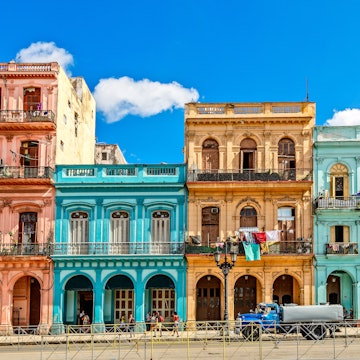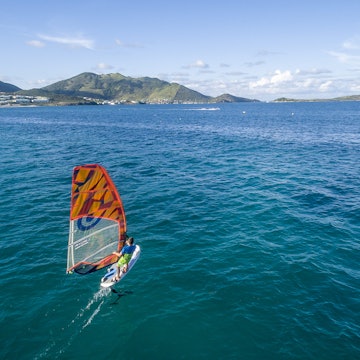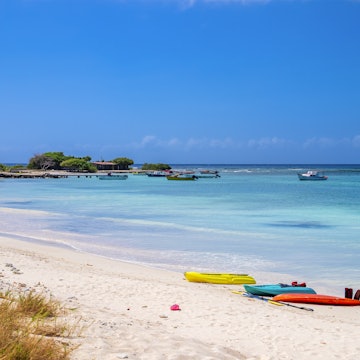

A beach, the sky and the Caribbean Sea – welcome to Aruba! © Shutterstock / Chiyacat
Breathtaking beaches, exhilarating nightlife and bountiful natural beauty await in Aruba. This idyllic island outpost is a highlight of the Caribbean – a dramatic landscape of cacti, volcanic rock and divi-divi trees that beckons to be explored.
There’s a reason Aruba is a bucket-list destination for travelers. The island is a playground for water sports such as kite surfing and scuba diving, and terrestrial adventures such as hiking and horseback riding. Its hub city, Oranjestad, has strong Spanish, Dutch and Indigenous influences, best discovered in its many restaurants, pubs and museums.
But how easy is it to enter the country? That depends on your passport. Here's everything you need to know about visas for Aruba.

Who can travel to Aruba without a visa?
Travelers from the United States, Canada, United Kingdom, Ireland and the 29 members of the Schengen Area (which includes most countries in the European Union) do not need a visa to enter Aruba for a stay of up to 90 days.
That number is extended to 180 days for those in Schengen countries and US nationals.
In addition, nationals from Central and South America, Asia, and Caribbean nations may be exempt. View the full list of countries able to visit without a visa here.
Special categories for visa-free travel
The following countries’ nationals may enter without a visa with conditions:
Hong Kong – holders of British National Overseas or Special Administrative Region passports
Macao – holders of Special Administrative Region passport
Taiwan – holders of a passport bearing their identity card number
Ukraine – holders of a biometric passport
Some holders of specialized passports are also allowed to enter Aruba without a visa. Diplomatic passport holders from Bolivia, Georgia, Indonesia, Jamaica, Malawi, Morocco, Pakistan, Senegal, South Africa, Thailand, Tunisia, Turkey and Ukraine do not need a visa.
Those with a refugee or stateless persons’ travel document issued by the Kingdom of the Netherlands or the US and holders of an alien’s travel document issued by the US or Canada are also welcome without a visa.
Holders of laissez-passer documents issued by the World Bank, International Monetary Fund, the United Nations or any of its agencies are exempt too, as are crew members of vessels or aircraft mooring or landing on the island.
Aruba also has the One Happy Workation program for digital nomads from the US (run in partnership with local resorts and hotels) which allows a 90-day stay. However, this does not allow you to work for any companies based in Aruba.
Transit travelers
Travelers spending 24 hours or less on the island can enter Aruba without a visa, regardless of their country of origin. This includes cruise ship passengers disembarking on the island as part of their voyage, as well as airline passengers transmitting to another country (or a neighboring Caribbean island) within 24 hours (48 hours for those from Bonaire, Curaçao, Saba and St. Eustatius). However, airline passengers may not leave the international transit zone.
Air and sea crew members can stay without a visa for up to 48 hours.
Who needs a visa for Aruba?
While Aruba’s generous visa exemption scheme means that many travelers can visit the island without a visa, travelers who do need a visa are in for some extra legwork.
Aruba is part of the Caribbean short-stay visa scheme, which allows entry to numerous islands in the region for up to 90 days. These multi-island, multi-entry visas are a convenient solution for those island-hopping around the southern Caribbean.
To obtain a Caribbean visa, visitors to Aruba must apply in person at either an Aruban embassy or an embassy or consulate of the Netherlands. The Kingdom of the Netherlands operates a convenient online portal with full details of the rules and regulations.
The list of nationalities who require a visa for Aruba is extensive and includes any nationals of countries not listed above.
Travel documents required for Aruba
In addition to visas, entry requirements for Aruba specify that you must have a valid passport for the duration of your stay and complete the mandatory Embarkation and Disembarkation (ED) card online before arrival.
Additionally, you need to show a return or onward ticket and provide proof of accommodation, whether through a hotel reservation, property ownership or invitation from a resident.
You may also be asked to demonstrate sufficient funds to cover expenses during your stay. While not mandatory, travel insurance with medical coverage is recommended.
Children younger than 12 do not need a visa if they are traveling with a parent or guardian. When you leave Aruba, the island offers customs preclearance for US travelers, which means that passengers returning to the US can clear customs on the island, skipping the long lines at mainland airports.

How to extend your stay in Aruba
Tourists who want to extend the initial 90– or 180–day stay can apply for a long-stay visa but often need a residence permit. This permit is also necessary for individuals planning to live, work or retire in Aruba.
There are three types of residence permits:
Temporary permits are suitable if you intend to stay for a specific period while working. Holders are prohibited from seeking employment unless explicitly authorized.
Permanent permits are designed for those wanting to make Aruba their long-term home. You must demonstrate financial self-sufficiency, provide a history of residence and employment over the past 10 years and present a police clearance certificate.
Work and residence permits are required if you wish to work in Aruba. Prospective employers must obtain a positive recommendation from the Department of Labor and a work permit from the Department of Immigration and Naturalization Services before they can start working.
A residence permit requires a sponsor, such as an employer or a partner and can be obtained at the Department of Integration and Management of Foreign Nationals in Oranjestad. If you intend to stay for work, you need to complete an application for a work permit through the same department.
Aruba's vaccination requirements
Travelers from areas where yellow fever is endemic, including most of Central America, Latin America and Africa, will need to show a yellow fever vaccination certificate on arrival. This includes passengers who traveled to those areas and spent over 12 hours.
The best time to visit Aruba
Renowned for its nearly 365 days of sunshine, Aruba is a year-round paradise. Still, the best time to visit Aruba is during the dry season, from mid–December to mid–April. It’s also Aruba’s high season, so the island comes alive with events and activities, although accommodation prices are typically higher.
Consider the shoulder months of May and November for a more budget-friendly experience with fewer crowds. These months often deliver excellent weather with warm temperatures and lower prices while avoiding the limited rainy season in late fall.
You might also like:
Best things to do in Aruba from skydiving to off-roading
When is the best time to go to Aruba
The top 7 beaches in Aruba














